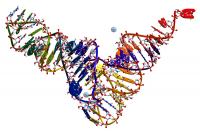Nucleic acids

Characterization of nucleic acids by Field-Flow Fractionation (FFF)
FFF is a family of analytical techniques which are ideally suited for very gentle and high resolution separation and characterization of large molecules and particles, which traditional chromatographic techniques cannot perform. In FFF the separation is achieved through the interaction of the sample with an external physical field instead of a stationary phase. FFF can separate both colloidal and soluble materials and has the advantage of avoiding problems associated with chromatographic techniques (Size Exclusion Chromatography) such as shear degradation, unwanted interaction between sample and stationary phase, and low separation power for large materials. Hence, an outstanding characteristic of FFF is the broad size range, 5 orders of magnitude from 1 nm to > 100 μm. No other technique can cover 5 orders of magnitude of particle size, that is the entire colloidal, polymeric and even most of the microparticle domain.
Samples are often very complex and heterogenous systems which are difficult to characterize. Using several FFF techniques is often a beneficial strategy, due to the more flexible separation ability and the broader and complementary scope of information which is then accessible. Postnova offers “The FFF Platform” which makes it possible to deploy any FFF separation technique and any light scattering and/or concentration detector. The FFF platform can be configurated and later upgraded with all commercially available FFF techniques, with on-line Multi Angle Light Scattering (MALS) and Dynamic Light Scattering (DLS) detectors, and with UV-Vis, RI and fluorescence detectors. The Postnova FFF platform has been widely coupled with most brands of ICP-MS. A fraction collector is also available for the collection of narrow fractions for further off-line characterization (with mass spectrometry, microscopy, etc).
During the past decades, FFF has been applied successfully for the separation, characterization and fractionation of a wide variety of large-size materials, including nucleic acids.
